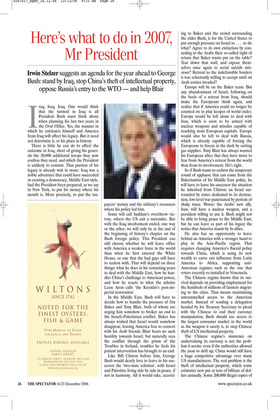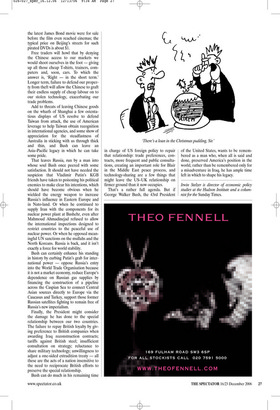Here’s what to do in 2007, Mr President
Irwin Stelzer suggests an agenda for the year ahead to George Bush: stand by Iraq, stop China’s theft of intellectual property, oppose Russia’s entry to the WTO — and help Blair Iraq, Iraq, Iraq. One would think that the turmoil in Iraq is all President Bush must think about when planning his last two years in the Oval Office. Yes, the manner in which he extricates himself and America from Iraq will affect his legacy. But it need not determine it, or his place in history.
There is little he can do to affect the outcome in Iraq, short of giving his generals the 30,000 additional troops they now confess they need, and which the President is unlikely to commit. That portion of his legacy is already writ in stone: Iraq was a noble adventure that could have succeeded in creating a democracy, Middle East-style, had the President been prepared, as we say in New York, to put his money where his mouth is. More precisely, to put the tax payers’ money and the military’s resources where his policy led him.
Some will call Saddam’s overthrow victory, others the US exit a surrender. But with the Iraq involvement ended, one way or the other, we will only be at the end of the beginning of history’s chapter on the Bush foreign policy. This President can still choose whether he will leave office with America a weaker force in the world than when he first entered the White House, or one that the bad guys still have to reckon with. That will depend on three things: what he does in his remaining years to deal with the Middle East, how he handles China’s challenge to American power, and how he reacts to what the scholar Leon Aron calls ‘the Kremlin’s post-imperial restoration’.
In the Middle East, Bush will have to decide how to handle the pressure of Jim Baker and Tony Blair, both of whom are urging him somehow to broker an end to the Israeli–Palestinian conflict. Baker has always wished that Israel would somehow disappear, leaving America free to consort with his Arab friends; Blair bears no such hostility towards Israel, but naturally sees the conflict through the prism of the Troubles in Ireland, troubles he feels his patient intervention has brought to an end.
Like Bill Clinton before him, George Bush would dearly love to leave to his successor the ‘two-state solution’, with Israel and Palestine living side by side in peace, if not in harmony. All it would take, accord ing to Baker and the crowd surrounding the elder Bush, is for the United States to put enough pressure on Israel to ... to do what? Agree to its own extinction by conceding to the Arabs their so-called right of return that Baker wants put on the table? Tear down that wall, and expose themselves once again to serial suicide missions? Retreat to the indefensible borders it was reluctantly willing to accept until six Arab armies invaded?
Europe will be on the Baker team. But any abandonment of Israel, following on the heels of a retreat from Iraq, should make the Europeans think again, and realise that if America could no longer be counted on to play keeper of world order, Europe would be left alone to deal with Iran, which is soon to be armed with nuclear weapons and missiles capable of reaching most European capitals. Europe would also be left to deal with Russia, which is already capable of forcing the Europeans to freeze in the dark by cutting gas supplies. Tony Blair has always warned his European allies that they have more to fear from America’s retreat from the world than from its involvement. He’s right.
So if Bush wants to eschew the temporary round of applause that can come from the Bakerisation of his Middle East policy, he will have to leave his successor the situation he inherited from Clinton: an Israel surrounded by states dedicated to its destruction, low-level war punctuated by periods of shaky truce. Worse: the Arabs’ new ally, Iran, will have a nuclear weapon, and a president willing to use it. Bush might not be able to bring peace to the Middle East, but he can leave as part of his legacy the notice that America stands by its allies.
He also has an opportunity to leave behind an America with a stronger hand to play in the Asia–Pacific region. That requires changing America’s flaccid policy towards China, which is using its new wealth to carve out influence from Latin America to Africa, supporting antiAmerican regimes such as the one that voters recently re-installed in Venezuela.
The Chinese regime knows that its survival depends on providing employment for the hundreds of millions of farmers migrating to the cities. That means maintaining untrammelled access to the American market. Instead of sending a delegation headed by his Treasury Secretary to plead with the Chinese to end their currency manipulation, Bush should use access to the largest consumer market in the world as the weapon it surely is, to stop Chinese theft of US intellectual property.
The Chinese regime’s insistence on undervaluing its currency is not the problem it seems: even if the authorities allowed the yuan to drift up, China would still have a huge competitive advantage over many US manufacturers. The real problem is the theft of intellectual property, which some estimates now put at tens of billions of dollars annually. Some 200,000 illegal copies of the latest James Bond movie were for sale before the film even reached cinemas; the typical price on Beijing’s streets for such pirated DVDs is about $1.
Free traders will howl that by denying the Chinese access to our markets we would shoot ourselves in the foot — giving up all those cheap T-shirts, trainers, computers and, soon, cars. To which the answer is, ‘Right — in the short term.’ Longer term, failure to defend our property from theft will allow the Chinese to graft their endless supply of cheap labour on to our stolen technology, exacerbating our trade problems.
Add to threats of leaving Chinese goods on the wharfs of Shanghai a few ostentatious displays of US resolve to defend Taiwan from attack, the use of American leverage to help Taiwan obtain recognition in international agencies, and some show of appreciation for the steadfastness of Australia in sticking with us through thick and thin, and Bush can leave an Asia–Pacific legacy in which he can take some pride.
That leaves Russia, run by a man into whose soul Bush once peered with some satisfaction. It should not have needed the suspicion that Vladimir Putin’s KGB friends have taken to poisoning his political enemies to make clear his intentions, which should have become obvious when he wielded the energy weapon to increase Russia’s influence in Eastern Europe and in Nato-land. Or when he continued to supply Iran with the components for its nuclear power plant at Bushehr, even after Mahmoud Ahmadinejad refused to allow the international inspections designed to restrict countries to the peaceful use of nuclear power. Or when he opposed meaningful UN sanctions on the mullahs and the North Koreans. Russia is back, and it isn’t exactly a force for world stability.
Bush can certainly enhance his standing in history by curbing Putin’s grab for international power — oppose Russia’s entry into the World Trade Organisation because it is not a market economy, reduce Europe’s dependence on Russian gas supplies by financing the construction of a pipeline across the Caspian Sea to connect Central Asian sources directly to Europe via the Caucasus and Turkey, support those former Russian satellites fighting to remain free of Russia’s new imperialism.
Finally, the President might consider the damage he has done to the special relationship between our two countries. The failure to repay British loyalty by giving preference to British companies when awarding Iraq reconstruction contracts; tariffs against British steel; insufficient consultation on strategy; reluctance to share military technology; unwillingness to adjust a one-sided extradition treaty — all these are the acts of a nation insensitive to the need to reciprocate British efforts to preserve the special relationship.
Bush can do much in his remaining time in charge of US foreign policy to repair that relationship: trade preferences, contracts, more frequent and public consultations, creating an important role for Blair in the Middle East peace process, and technology-sharing are a few things that might leave the US–UK relationship on firmer ground than it now occupies.
That’s a rather full agenda. But if George Walker Bush, the 43rd President of the United States, wants to be remembered as a man who, when all is said and done, preserved America’s position in the world, rather than be remembered only for a misadventure in Iraq, he has ample time left in which to shape his legacy.







































































































































 Previous page
Previous page